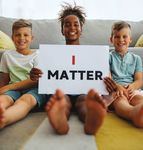Helping Your Child Prepare for Vaccine Shots - Seattle ...
←
→
Page content transcription
If your browser does not render page correctly, please read the page content below
A Seattle Children’s Publication | Summer 2021
Helping Your Child Prepare for Vaccine Shots
The pandemic has caused such a disruption numbing cream. Just before the injection is
in our daily lives and routines, many families given, tell your child they may feel a pinch that
have fallen behind on health-related tasks. will be over quickly. Have them turn their head
If you haven’t already done so, be sure your away from the needle, then distract them with a
child gets caught up on their medical and toy or photo. For kids ages 4 and up, teach them
dental checkups and bring them up to date to ‘blow away’ the pain: have them take a long,
with their vaccines. Vaccines prevent diseases deep breath, then blow out gently and evenly
that can make children very sick and cause — as though blowing soap bubbles. After the
shot, give plenty of praise and comfort.
lifelong disabilities — and even death.
School-Age Kids, Tweens and Teens.
These tips will help you and your child feel
Before the day of the shot, ask about prepping
calm and confident before, during and after
with a skin-numbing cream. Calmly tell your
any vaccine shot.
child what’s going to happen; don’t tell them it
Babies. Breastfeeding mothers can nurse distract them with a favorite toy. After the won’t hurt or ask them not to cry. Suggest that
their baby during and after the vaccine. If vaccine, provide lots of comforting hugs and they turn their head away from the needle, and
breastfeeding is not an option, ask about soothing words. offer other choices if possible, such as where
giving oral sucrose during and after the shot. Toddlers and Preschoolers. Before the day they’d like to sit and which arm they prefer to
Cradle and talk to your baby, and perhaps of the shot, ask about prepping with a skin- get the injection in. Praise them for their
successes, such as staying still and being
cooperative. To prevent fainting (not unusual
for tweens and teens after a shot), have them
sit or lie down for 15 minutes afterwards.
Make Sure Bike, Scooter and Skateboard Helmets Fit The Pfizer COVID-19 vaccine is available
Use this easy, three-point check to test for 3. Mouth for kids ages 12 and older. And by the time
a proper helmet fit. The buckled chin strap is loose enough so you read this, a vaccine may be offered (or
1. Eyes that your child can breathe. There should available soon) for children younger than 12.
Helmet sits level on your child’s head and be enough room so you can insert a finger It’s safe to get the COVID vaccine at the same
rests low on the forehead, one to two finger between the buckle and chin. It should be time as other vaccines, according to the
widths above the eyebrows. A helmet tight enough that if your child opens their American Academy of Pediatrics.
pushed up too high will not protect the mouth, you can see the helmet pull down If you have questions about any vaccine, be
face or head well in a fall or crash. on top. sure to ask your child’s healthcare provider.
2. Ears
The straps are even, form a ‘Y’ under to learn more: to learn more:
each earlobe, and lay flat against the head. Visit MakeSureTheHelmetFits.org.
Visit cdc.gov/vaccines/parents/visit/
before-during-after-shots.html.Is Your Child Getting Enough Sleep?
Sleep is crucial for the health and development of all Gradeschoolers ages 6 to 12 years: 9 to 12 hours.
kids, from babies to teens. Use these guidelines to Teens ages 13 to 18: 8 to 10 hours.
know how much sleep children need at different stages. Children who get enough sleep have healthier
Infants ages 4 to 12 months: 12 to 16 hours, immune systems, plus better school performance,
including naps. memory, behavior and overall mental health.
Toddlers ages 1 to 2 years: 11 to 14 hours,
including naps. to learn more:
Preschoolers ages 3 to 5 years: 10 to 13 hours, Visit seattlechildrens.org/pdf/PE1066.pdf.
including naps.
Dealing with Racial Bias
The effects of racism are so damaging to understanding. Raising kids who are free of racial
individuals and our entire society, it is considered bias requires keen awareness, daily effort and
a public-health crisis. As parents, we must be thoughtful conversations. It starts with facing our
aware of racial bias from the day our children are own biases and taking steps to honor and celebrate
born. The American Academy of Pediatrics tells us differences among people. Since our children
that babies can notice race-based differences as closely observe our actions and learn from them,
early as 6 months. By ages 2 to 4, children can it’s important that they see us interact with others
internalize or absorb racial biases simply by in a genuinely kind and inclusive way.
soaking in the actions and attitudes that surround
them. And by age 12, kids can become set in their to learn more:
beliefs. This means that we have roughly a decade Visit healthychildren.org/English/healthy-living/
to shape a child’s learning process in a way that emotional-wellness/Building-Resilience/Pages/
reduces racial bias and improves cultural Talking-to-Children-About-Racial-Bias.aspx.
Prevent Drownings with Constant Supervision
For children ages 1 to 4, drowning is the leading water, adults can take turns being the ‘water
cause of unintentional death, and most of these watcher.’ Pools and spas are not the only
drownings happen in private swimming pools hazards, of course: be vigilant when you are at
and spas. It’s understood that children must be a picnic area or park or campsite that has a
closely supervised anytime they’re in the water. beach, lake, pond, river or stream nearby.
But tragically, many drownings happen when a ‘Layers of protection’ are the surest way to
child enters the water without being seen or prevent drownings. These essential ‘layers’
heard. In a typical scenario, a child wanders away include constant adult supervision, teaching
from adult supervision unnoticed and enters or children to swim at an early age, ensuring that
falls into a deserted pool or spa. So, it’s essential hotel or at a vacation rental. Especially in life jackets are worn in or near the water, and
that pool and spa areas are fully fenced and that group settings, at least one adult should stick being trained in CPR in case life-saving skills
gates are always locked — and ideally alarmed with a child to ensure they don’t slip outside are needed.
— to keep children out. Even with these or wander off. Share this duty with other
safeguards in place, constant supervision is still adults and be sure there’s a clear hand-off of to learn more:
needed whenever there’s a pool or spa nearby; this duties from one guardian to the next. For Visit pulse.seattlechildrens.org/layers-of-
might be at the home of friends or family, at a large gatherings where kids will be in or near protection-for-safe-water-fun.Kid Bits
Childhood Tics Tummy Time Saying Goodbye to the Pacifier
Tics are unintentional movements or sounds When infants play on their tummies, it’s a Babies and toddlers often stop using pacifiers
that are sudden, brief and repetitive. They chance for them to develop their motor skills, on their own. If they don’t, the American
commonly include rapid eye-blinking, facial their vision and their senses. It also strengthens Academy of Pediatric Dentistry (AAPD)
grimaces, head movement, sniffing and their muscles, especially their neck muscles, and recommends that parents begin weaning a
throat-clearing. Childhood tics are common: helps prepare them for sliding, scooting and child from a pacifier before age 24 months,
up to 20% of kids may develop them. Typically, crawling. Plus, this activity helps prevent a flat to avoid long-term oral problems. Start by
tics become apparent at age 6 or 7 and peak spot from forming on the back of their head. limiting pacifier use to naptime, before bed
around ages 10 to 12. For most kids, these Tummy time must always be supervised by a and for stressful moments. You might also
movements and sounds are just a nuisance, and parent or caregiver. Since it’s an active time, try a new comfort item, like a soft blanket
the child simply outgrows the tics. In general, if babies need to be fully alert, with an adult with a silky edge. Always keep it positive:
a tic isn’t bothering your child, don’t let it nearby to interact and encourage them. And praise and reward your child for not using
bother you — and don’t draw attention to it. If remember that for sleeping, babies must always the pacifier. Some families celebrate saying
you are concerned, you can ask your child’s be placed on their backs in their own sleep space. goodbye to ‘binky’ forever with a special
doctor to evaluate it. You might want to Cribs need a firm mattress with a tight fitted ceremony, party or gift. If pacifier use
capture the tic on video to show your doctor, sheet — and no blankets, bumpers or soft toys. continues past age 3, the AAPD recommends
since it might not occur during the visit. a dental evaluation to prevent potential
to learn more: long-term problems.
to learn more: Visit healthychildren.org/English/ages-
Visit pulse.seattlechildrens.org/childhood- stages/baby/sleep/Pages/Back-to-Sleep- to learn more:
tics-will-my-child-outgrow-them. Tummy-to-Play.aspx. Visit healthychildren.org and search ‘pacifier.’
Quick Tip Regional Clinic Locations
• Bellevue
• Everett
• Olympia
• Tri-Cities
Online Resources
Visit seattlechildrens.org for the following:
• Child Health Advice
• Federal Way • Wenatchee • my Good Growing email newsletter
Create a system to check the • Doctor Finder
back seat for your baby or Primary Care Clinic • On The Pulse and Autism blogs
• Odessa Brown Children’s Clinic • Medical condition information
toddler every time you get out
Main Hospital Numbers • Health & safety information
of your car. Never leave a young • Ways to help Seattle Children’s
206-987-2000
child alone in a car. 866-987-2000 (Toll-free) • Research Institute information
facebook.com/seattlechildrens
Heather Cooper is the Editor of Good Growing, which is produced four times a year by the Marketing Communi-
cations Department of Seattle Children’s. You can find Good Growing in the January, April, July and October
instagram.com/seattlechildrens issues of ParentMap and on our website seattlechildrens.org. For permission to reprint articles for non-
commercial purposes or to receive Good Growing in an alternate format, call 206-987-5323. The inclusion of any
resource or website does not imply endorsement. Your child’s needs are unique. Before you act or rely upon
twitter.com/seattlechildren
information, please talk with your child’s healthcare provider. © 2021 Seattle Children’s, Seattle, Washington.
youtube.com/seattlechildrensClasses and Events
As the COVID-19 situation changes, we continue to adjust or postpone our classes and events to follow public-
health recommendations. We now offer some classes online while some are on pause. Please check our website
for the latest information. Scholarships are available. If you would like to ask about a scholarship, use the contact
information for the class you’re interested in to connect with the registrar.
PARENTING CLASSES CHILD, PRETEEN AND TEEN CLASSES The Chat
Autism 101 Better Babysitters The Chat is a new online workshop series on
This free 90-minute lecture is designed to provide For youth, ages 11 to 14. Students learn about puberty and sex that reflects the content from
information and support to parents and families responsible babysitting, basic child development, the in-person classes, For Boys and For Girls.
of children recently diagnosed with an autism infant and child care, safety, handling emergencies, Offered via Zoom, each 45-minute workshop is
spectrum disorder. A portion of each session is age-appropriate toys, business tips and parent for preteens 10 to 12 years old, plus a parent or
dedicated to answering questions from the expectations. trusted adult.
attendees. You may take any individual workshop or all
This is currently a two-part class, with sessions
View dates, sign up for live streaming or view a taking place via Zoom on two consecutive five. If you register for all five events, we
past lecture at seattlechildrens.org/autism101. weekend dates. Each session is two hours long. recommend starting with BO, Pimples and Hair
Email Autism101@seattlechildrens.org if you have The fee is $50. Learn more, view dates and — Oh My! and ending with Being Connected:
questions. register at seattlechildrens.org/classes or call Sex, Love and Everything In Between. While
206-987-9878 if you have questions. families can choose to attend any combination
Autism 200 Series of workshops, the information in earlier sessions
Body Talk: Building Body Wisdom provides a foundation for understanding later
Autism 200 is a series of free 90-minute classes sessions.
for parents and caregivers of children with autism For all preteens, ages 9 to 12 and a grownup.
who wish to better understand autism spectrum This is no ordinary class on nutrition and fitness. The fee is $25 per workshop or the series of
disorder. Each class features a different topic. Body Talk is about learning new tools together five for $100. Learn more, view dates and
that help us understand how our bodies and register at seattlechildrens.org/classes or call
Classes are on pause, but you can view past minds work as we eat and move. Topics include 206-789-2306 if you have questions. See a
Autism 200 lectures at seattlechildrens.org/ how to build a healthy relationship with food and trailer for The Chat at greatconversations.com.
autism200. Email Autism200@seattlechildrens. trust yourself as an eater, and how to build a
org if you have questions. healthy relationship with exercise and trust
EVENTS
yourself as a mover. Free Car-Seat Checks by Appointment
Babysafe
Only
This class is offered as a two-part online
Babysafe is a 4-hour class for new and expectant
workshop series. The fee is $45. Learn more, WHEN: Saturday, Aug. 21 and Saturday, Oct. 23
parents and others who care for babies. Topics
view dates and register at seattlechildrens.org/ WHERE: Seattle Children’s
include infant development, baby safety, injury
classes or call 206-789-2306 if you have REGISTER: seattlechildrens.org/carseatchecks
prevention and care of common injuries for infants
questions.
from birth through 12 months of age. Infant CPR is Register for an appointment and come learn
demonstrated and practiced, but this is not a CPR and First Aid for Babysitters how to safely secure your child in the car. Child
certification class. passenger safety experts will check your child in
For youth, ages 11 to 15. Topics include pediatric a car seat, booster seat or the seat belt and
This class is currently available virtually via Zoom.
CPR, treatment for choking, and first-aid skills. answer any questions you may have. Car-seat
The fee is $85 and each registration is good for
Students receive an American Heart Association checks will follow COVID-19 safety protocols.
two people from the same family. Learn more,
Heartsaver Pediatric First Aid, CPR, AED
view dates and register at seattlechildrens.org/
classes or call 206-789-2306 if you have
completion card, which is valid for two years. Free Virtual Car-Seat Checks
questions. This class is offered as a two-part series. The King County Certified Child Passenger Safety
series includes a virtual session as well as a short Technicians are offering free virtual car-seat check
Youth Mental Health First Aid in-person skills check. The fee is $75. Learn more, appointments via video-chat platforms. For more
view dates and register at seattlechildrens.org/ information, email Laura Miccile at laura.miccile@
This free class is for adults who regularly interact
classes or call 206-987-9878 if you have kingcounty.gov or call 206-477-8664.
with adolescents ages 12 to 18. Youth Mental
questions.
Health First Aid will improve your knowledge of South County Fire and Safe Kids Snohomish
mental health and substance use problems and County are offering free virtual car-seat classes.
will teach you how to connect youth with care Registration is required. Visit southsnofire.org/
when needed. education/child-passenger-safety.
Youth Mental Health First Aid is now available as
a two-part virtual series. The series includes a
self-guided course and a live instructor-led
course. The date you register for is the date of
the live instructor-led course. Learn more, view
dates and register at seattlechildrens.org/classes
or call 206-987-9878 if you have questions.You can also read
























































